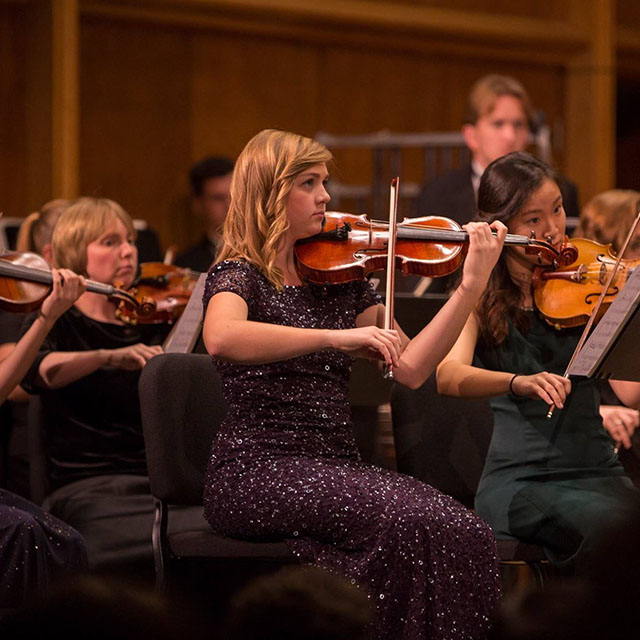Senior music performance major Sofiya Prykhitko and sophomore Sage Yang come from very different cultural backgrounds with very different views on the purpose of music.
the true beauty behind music
Both performers are in Biola’s symphony orchestra and are rehearsing for the Symphony Concert on Saturday, April 8. Prykhitko and Yang have practiced music nearly their entire developmental lives, and they have both made conscious decisions to continue doing so into the professional sphere.
While different futures lie ahead for them, the passion which drove them to music is a beautiful story in itself.
“I started lessons when I was six years old on the violin. I just fell in love with it right away. I started pursuing it, and decided to pursue it as a career as well,” Prykhitko said. “I wouldn’t say it’s a common language, because there’s different cultures out there, but it does bring people together.”
Yang took a different road. Coming from an Asian background and moving to the U.S. when she was young, her family took to music with what she describes to be a black-and-white, success or failure perspective. She rehearsed at the Seoul Institute of the Arts, a prep school for middle and high school students going into music as a career.
While Yang stresses the instructors at the institute were talented and loving, the program ran on a subjective mentorship assignment in which students were organized into groups depending on how quickly they could pick up new content. After moving to the States, Yang understood the true beauty behind music was not just playing notes on the page, but the drive and heart behind it.
“I think the best way to put it is I was more concerned with being ‘good’ or being ‘not good.’ I think here, with working with the teachers that really have a personal view of music and a personal philosophy on teaching and showing God’s love through that teaching, that definitely affects you in a different way than other places,” Yang said.
musicians speaks volumes
In a publication by University of California Irvine anthropology professor emeritus Robert Garfias, he explains culture has a large impact on music, as well as music composition. He explores the cultural effect of Turkish folk music primarily, but acknowledges cultures of all types are impacted irrevocably by the concept of music.
“If we look at all the societies and cultures known to us and look at all the historical societies of the past to the degree that we can discern, we can deduce with a high degree of certainty that music has always played an important role in human society,” writes Garfias in chapter one of his work, “Music: the Cultural Context.”
Yang admits the influence her parents had on her growth as a musician is substantial, and the views of her family reflect her own, though impacted by Western culture just as much as her Eastern roots.
“My mom actually wanted me to dance when I was younger. She took me to ballet, and I saw the orchestra in the pit and I figured I wanted to play the instruments instead of being on the stage,” Yang said. “I was born in Korea, so a lot of my family has different views on arts and sciences, especially. They would also view it black-and-white, not something you would do to show your emotion or as a part of your soul.”
More so, Prykhitko even expands on the influence music has had on her development as a person in the world, as well as how she views people and life in general. Her worldview has been altered by music, and no harm is in sight.
“[Understanding music history] changes the way you approach music as well, because you see such a long period of growth over the years,” Prykhitko said. “Even though it has no words, violin music has no words, I think the power of creativity and beauty that we have a musicians speaks volumes. It’s a way of connecting people with different backgrounds and people who are very diverse from you.







